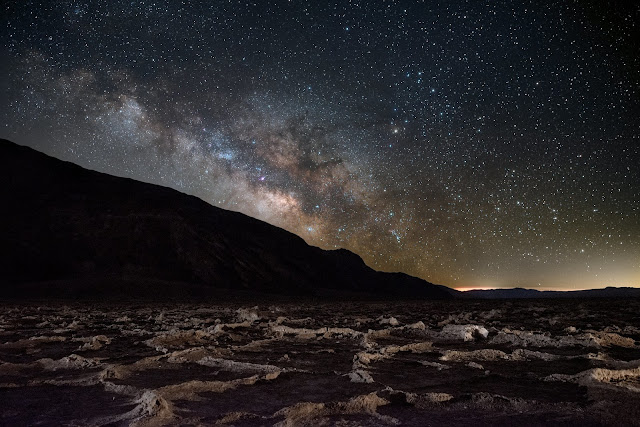Galaxy-rise at Badwater Basin
"We scouted the shot in daylight and planned to head back around 2:30 a.m., knowing it would take us a good 20 minutes to walk from the parking lot to the location, and then set up and take foregrounds before shooting the galaxy."
"When we arrived that night, we had the place to ourselves. We joked that there weren't a lot of other people so crazy to be out there at that time of night in the late-winter cold."
"We hiked out into the basin, found a good spot, set up low-level lights, and started shooting. Really magical. The Milky Way was rising roughly parallel to the mountains by about 3:30. It was super late, cold, and we were sleep deprived from shooting the previous night, but glad to have captured this shot."
Technical details:
This image is a blend of:
- A focus-stacked foreground, with 3 stacked exposures to reduce noise at each of three depths (9 exposures total)
- A stacked sky consisting of 20 exposures stacked with Starry Sky Stacker
All exposures are 10 sec at 20 mm, f/2.8, ISO 3200.
The Fading Milky Way
Light pollution is a growing environmental problem that threatens to erase the night sky before its time. A recent study revealed that perhaps two-thirds of the world's population can no longer look upwards at night and see the Milky Way—a hazy swath of stars that on warm summer nights spans the sky from horizon to horizon.
The Milky Way is dimming, not because the end of the Universe is near, but rather as a result of light pollution: the inadvertent illumination of the atmosphere from street lights, outdoor advertising, homes, schools, airports and other sources. Every night billions of bulbs send their energy skyward where microscopic bits of matter—air molecules, airborne dust, and water vapor droplets—reflect much of the wasted light back to Earth.
(Source: NASA)
Credit: Preston Dyches
Location: Death Valley, California, USA
Image Capture Date: February 27, 2022
#NASA #Space #Astronomy #Science #MilkyWay #Stars #LightPollution #CitizenScience #Astrophotographer #PrestonDyches #Astrophotography #Skywatching #Cosmos #Universe #SolarSystem #Earth #DeathValley #California #JPL #UnitedStates #STEM #Education

No comments:
Post a Comment